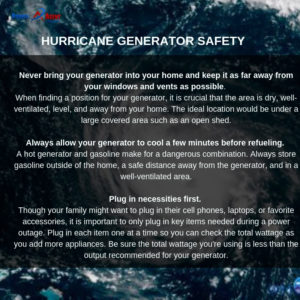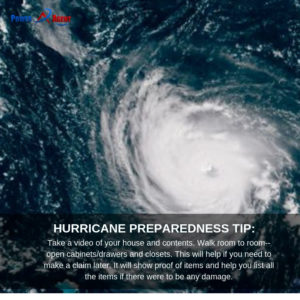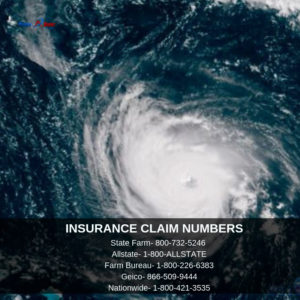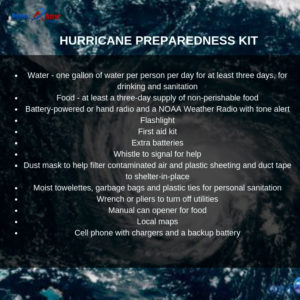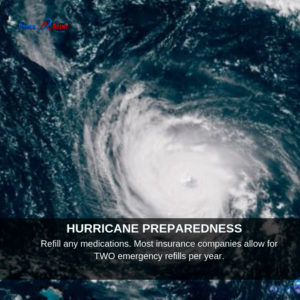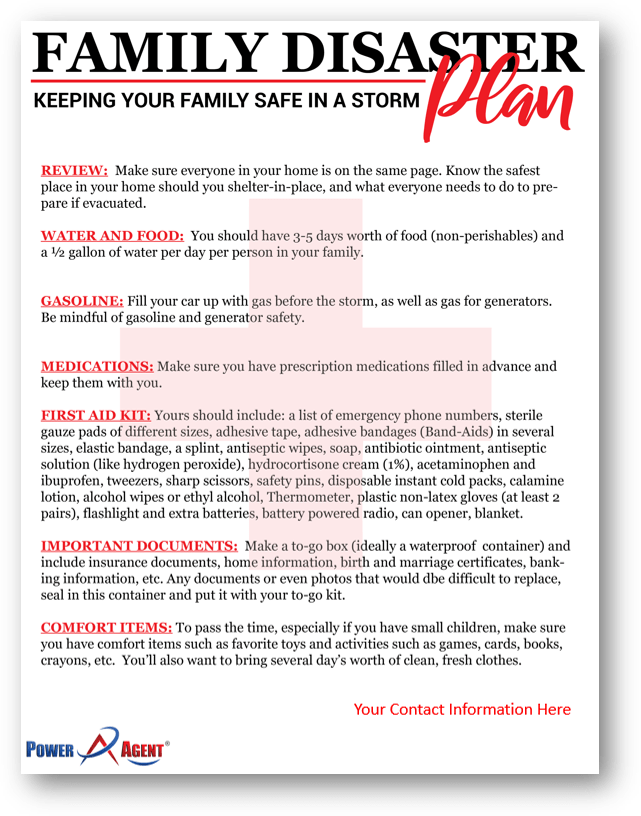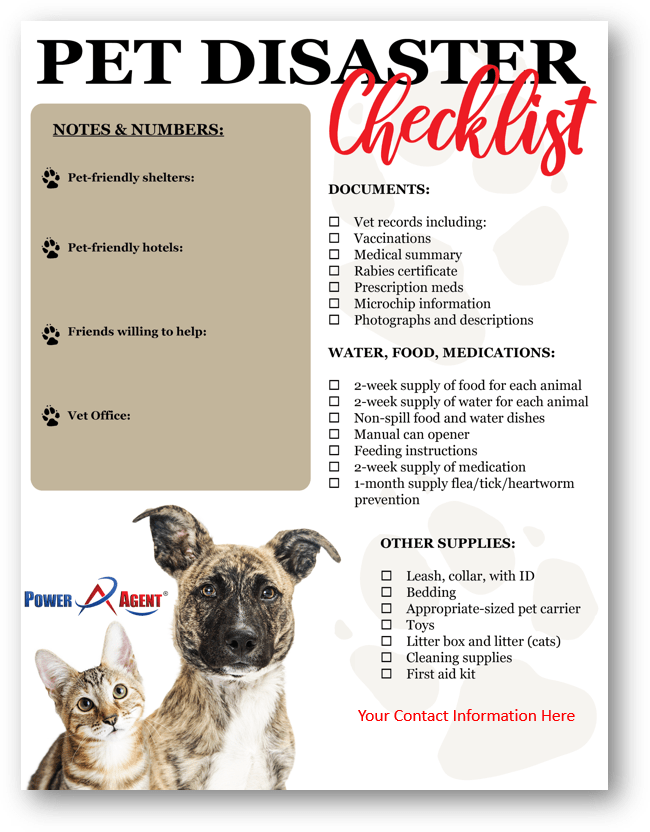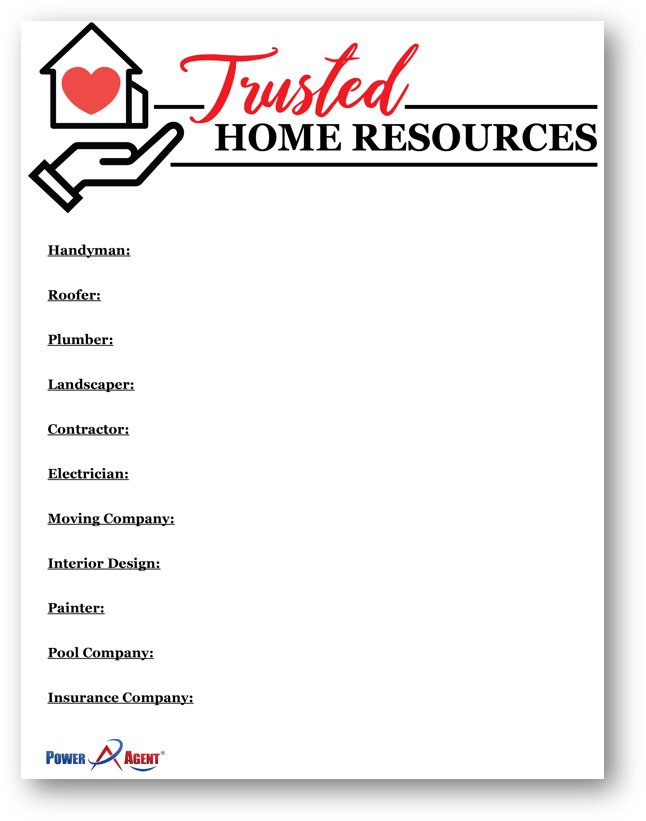Disaster Tools
REALTORS DISASTER RELIEF RESOURCES:
We hosted a special call a few years ago to strategize ideas to help agents work together, get the resources they need, help each other, and help those in communities affected by natural disasters. Below are the recording and a resource list that will continue to grow as new ideas come in.
Ideas from the call:
- NAR Resources – relief fund to help agents with lost commissions, expenses
- Work with neighborhood Facebook pages (or set some up) to disseminate hyper-local information and keep people informed
- Create printable flyers with must-know resources and distribute to sphere and farm areas (Insurance, FEMA, Important numbers, etc.)
- Set up a landing page and get a team together to create a “clearinghouse” resource for area rentals to house people displaced from the disaster (Agents contacting area apartment complexes, suite hotels, property management companies, etc.)
- Resource page for people with pets large and small
- Contacting radio and TV stations to help share the resource pages that are being set up in the area for those who don’t have internet
- Putting flyers for where people can get more information in local grocery stores, gas stations, and laundromats
- Calling vacant homes for sale to potential turn them into short-term rentals for people who are displaced
- Contacting furniture retailers (local and national) about providing discounts, rentals on needed furniture
- Lists of shelters
- Lists of what people need to have in their disaster kit (medications, documentation, insurance information
- Put a list of trusted resources together for your sphere and farm including landscapers, plumbers, roofers, electricians, building contractors, water damage companies, movers
We will be working on this growing list of resources and creating templates for agents to use as well. Want to send us YOUR great ideas to add to this compilation? We’d love to hear from you. Simply use our SUGGESTION BOX page to send us your tips!
---------------------------------------------------------------------------------
NAR: REALTORS® Relief Foundation – We’ve put a call in to them to learn the scope of their assistance and to see if we can partner with them to develop a comprehensive package for agents to share with each other and consumers in their market area.
FEMA: 1 (800) 621-3362 https://www.fema.gov/contact-us
Disaster Emergency Supply List
INSURANCE CLAIM NUMBERS:
State Farm- 800-732-5246
Allstate- 1-800-ALLSTATE
Farm Bureau- 1-800-226-6383
Geico- 866-509-9444
Nationwide- 1-800-421-3535
More available from the Insurance Information Institute here.
We will be editing the following to create pieces for Power Agents;
National Flood Insurance Information: https://www.floodsmart.gov/
Social Media Graphics to Share. Right-Click each image and save as a file to your computer - then you can upload to share!
What to Do Before a Hurricane Strikes
- Food and Water: Stockpile drinking water and nonperishable food. Choose products that can be eaten without cooking and rotate the food items in your pantry to keep them fresh. Be sure to keep a manual can opener on hand and stock up on pet food as well. When a hurricane is heading your way, line bathtubs with plastic and fill them with water to use for bathing, toilets, etc. (but not for drinking). After the storm passes, eat perishable food first.
- Fuel: Following a natural disaster, the gas grill might be the only method of cooking available, so be sure the propane tank is full and keep a spare on hand. If a hurricane is approaching, don’t wait until the last minute to top off the gas tank in your car and fill several approved gas cans as well. Be sure not to store gasoline in your home or near an ignition source such as a gas hot water heater.
- Lighting: It’s always darkest after the storm, so be sure you have several flashlights and plenty of batteries. While propane camping lanterns should not be used indoors, portable lamps that run on batteries are available in incandescent and fluorescent versions. Due to the increased risk of fire, avoid the use of candles. If you must use them, don’t leave candles unattended and keep a fire extinguisher nearby.
- Information: In the aftermath of a natural disaster, a battery-powered weather radio and AM/FM radio are your lifelines to the outside world. Battery-powered portable television sets can be useful as well.
- Communication: Charge up cell phones and keep a portable charger on hand that works in your car. Also, be sure you have a telephone that does not require electricity to operate.
- Medical Supplies: Fill prescriptions in advance and keep a first aid kit handy. Don’t forget to stock up on supplies like toilet paper, hand sanitizer, and disposable diapers.
- Money: When the power is off after a natural disaster, cash is often the only medium of exchange. Keep some smaller bills and coins as well, since change could be hard to come by.
- Smoke and Carbon Monoxide Detectors: Be sure to have battery-operated models on hand that will work when the electricity is out.
- Tarps and Tape: Stock up on tarps, rolls of plastic, rope, and duct tape to use for emergency repairs after the storm.
- Tools: Charge up cordless tools and make sure you have adequate hand tools to use while the power is out. While a gas-powered chainsaw can be your best friend after the storm, it can also result in serious injuries at a time when emergency help might not be able to reach you.
- Generators: Though worth their weight in gold after a storm, carbon monoxide poisoning from generators is a leading cause of post-storm fatalities resulting from electrocution and fire. Generators should only be operated in the open and at a safe distance from the home. They should not be used in an enclosed storage building, garage, carport, basement, crawlspace, or near open windows or doors. Extension cords should be adequate to handle the load and don’t try to draw more power than the generator is rated to supply. Be sure to turn a generator off and allow it to cool before filling it with gas.
- Film everything. Go room by room in your home and document your valuables and belongings, including serial numbers on computer, televisions, equipment for insurance purposes.
- Yard: Bring any lawn furniture, grills, bikes, toys, garbage cans, potted plants, and other loose items inside or store them in a garage or storage shed.
- Windows: Remove screens from windows. If available, screw 5/8-inch thick exterior plywood over them.
- Trees: Trim overhanging limbs away from the house.
- Boats: Take tarps off of boats. Remove any loose items and tie-down securely.
- Cars: Park cars away from trees and power lines.
- Utilities: Locate cut-offs for gas, electricity, and water. Have adequate tools on hand to turn them off if necessary.
What to Do After a Hurricane Strikes
If your home has been damaged by a hurricane, take the following steps:
- Photograph and Document Damage: Document the damage thoroughly with photos, as it will make the insurance claims process much easier. In addition to photos, keep a running list of all damaged items.
- Conduct Emergency Repairs: Do only what’s necessary to prevent further damage after a storm, such as covering broken windows with plastic or roofs with tarps to keep the rain out. Don’t make or commission permanent repairs until an insurance adjuster reviews the damage. While it may be tempting to start cleaning up and throwing out damaged items after the storm, your insurance adjuster needs to see what happened firsthand to make you the best offer to settle your claim.
- Secure Home Inventory: All home insurance policyholders should compile a home inventory of their possessions before a storm strikes, and keep it in a safe place. A home inventory is a list that documents the contents of your home. It should include photos, detailed descriptions, and purchase receipts when possible. Having a home inventory will make the claims process much easier. If you don’t currently keep a home inventory, start one as soon as possible.
- File a Claim ASAP: Insurance companies sometimes work on a first-come, first-served basis; so, it’s in your best interest to file an insurance claim as soon as possible. When you contact your provider, let them know the extent of the damages and that you have an inventory of your possessions. An insurance adjuster will come to your property, assess the damage, and determine the size of your payout.
- Secure Safe Lodging: If your home is uninhabitable, you’ll need to find your family a safe place to stay while your home is being repaired. The loss of use coverage in a standard homeowner insurance policy typically helps pay for your family’s lodging as long as the damage is part of a covered claim. Check your policy or ask your agent to make sure you have this coverage and to determine its monetary value and time limits.
Generator Safety
Never bring your generator into your home and keep it as far away from your windows and vents as possible.
When finding a position for your generator, it is crucial that the area is dry, well-ventilated, level, and away from your home. The ideal location would be under a large covered area such as an open shed.
Always allow your generator to cool a few minutes before refueling.
A hot generator and gasoline make for a dangerous combination. Always store gasoline outside of the home, a safe distance away from the generator, and in a well-ventilated area.
Plug in necessities first.
Though your family might want to plug in their cell phones, laptops, or favorite accessories, it is important to only plug in key items needed during a power outage. Plug in each item one at a time so you can check the total wattage as you add more appliances. Be sure the total wattage you're using is less than the output recommended for your generator.
Hurricane Deductibles
Providers typically include a hurricane deductible in insurance policies for coastal homes. Most other insurance deductibles have a set dollar amount, but hurricane deductibles are set at a percentage of the home’s value.
That means if a house is valued at $300,000 and has a 5% deductible, the policyholder must contribute $15,000 out of pocket toward repairs or replacement before the policy begins paying. This applies only when a home is damaged or destroyed by a hurricane.
To see if your policy includes a hurricane deductible and how much it is, contact your insurance agent.
Here are some helpful links and apps that you should download in advance of the storm.
Hotels that accept pets: If you are evacuating with your pet, click here to find hotels that allow pets.
Airports: To check on the status of airports, click here.
Gas: For gas availability, click here at GasBuddy.
Traffic: For traffic slowdowns or wrecks, road closures and other real-time traffic issues, go to Waze.
Hotel information: To find a hotel room, see expedia.com.
More on weather
If you need more information about weather, public alerts, shelters, forecasts and more, go to Google.org’s crisis maps.
Weather: Noaa.gov
How to use the internet during a storm when your internet is down
Miscellaneous
Other hurricane apps are available from a collection at the Google Play store.
Zello: This app became popular during Hurricane Irma last year. Zello can convert your phone into a sort of walkie-talkie or two-way radio. You must have a WiFi connection to use it. You can instantly send voice messages or photos.
Red Cross Apps: There are several apps hosted by the Red Cross including first aid apps for humans and pets. A Red Cross app also downloads information to your phone so you can access it even when cellphone towers are down.
Facebook Safety Check: You can mark yourself safe on this Facebook app to let family and friends know you are OK. You can also check on your family and friends.
ICE Standard: The ICE Medical App lets you put your emergency medical contact Information on a smartphone.
Nextdoor: Nextdoor connects you with people in your neighborhood.
Life360: If you are evacuating, this app can let family and friends know where you are. Life360 will track your movements and automatically send texts to those you chose to share that information with.
State Attorney Offices: I would list your specific state attorney's name and number - so people can report price gouging and unethical contractors
NEW INFORMATION:
EVERYONE, PLEASE FEEL FREE TO SHARE!!!
We just got this information from a resource in Florida and wanted to share it with those affected by Hurricane Michael.
These are some relief programs to help you financially during this time.
You do not need proof of damage for any of these programs. You simply tell them that you were affected by the hurricane whether it be that you evacuated, lost power and food, or cannot work due to the hurricane, therefore are not making money at this time.
Mortgage hurricane forbearance: Call your mortgage company and ask for if they provide forbearance for those who were in a zone that was declared a state of emergency and your home was in the path of the hurricane. Ask what payment options might be available to you. In some cases, companies will offer several months relief of payment and just add to the end of the loan. Every company is different, but explain the hardship and find out what options they offer.
Car Loan forbearance: Similar to your mortgage loan. Call your company and find out what payment options might be available in the light of hardship.
Credit cards: Most will allow some forgiveness of late payments or suspend payment and interest issues for a few months. Call your creditors and ask.
Emergency SNAP (food stamps): Keep an eye out for announcements of an event in your city for emergency food stamps! Even if you don’t qualify for food stamps now, if you lost power and food then you will qualify for the emergency food stamps. In Jacksonville, they had a huge event with FEMA the week after hurricane IRMA. The event was for four days and while the lines were long, families were granted sometimes thousands in emergency food stamps to help their family survive the hardship of loss after the disaster.
Become a Power Agent In Real Estate
Schedule a consultation or receive a trial membership.

